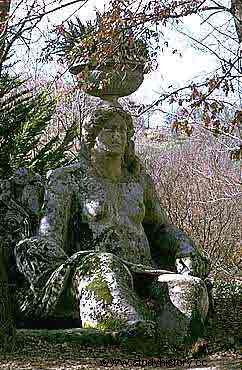
In Greek mythology, Demeter (in ancient Greek Dêmếtêr which derives from Gễ Mếtêr, "the Earth-Mother" or from Dêmomếtêr, "the Mother of the Earth", from dễmos, "the land, the country") is the goddess of the agriculture and harvest. The Romans associated it with Ceres. Hesiod's Theogony makes her a daughter of the Titans Cronos and Rhea, sister of Zeus, Poseidon, Hades, Hestia and Hera and mother of Persephone.
When Hades, ruler of the dead, kidnapped Persephone to make her his wife, Demeter went in search of her and neglected the harvests of the Earth. Taking the form of an old woman named Doso, she wandered for nine days. Zeus, realizing that a famine threatened mortals, decided to send Hermes to the kingdom of Hades to ask him to return Persephone to her mother. But Persephone had eaten a seed of the pomegranate offered by Hades as a final ruse to keep her with him, and tradition dictated that anyone who ate in the realm of the dead could not leave it. Zeus arranged for Persephone to spend the six or eight cultivable months on Earth with her mother and the rest of the year with her husband.
But Demeter did not only have Persephone. The hero Iasos united with her in a field plowed three times and gave her a son who was called Ploutos and who became the personification of wealth. Homer mentions that Zeus, out of jealousy, struck down Iasos. United to Poseidon, she also conceived Arion, an immortal horse, and a mysterious goddess, whose name it was forbidden to pronounce:also this daughter of Demeter was referred to as Despœna (="the Mistress")[1] . Legend has it that having conceived Despoena during her quest for Persephone, Demeter had her raised by a Titan named Anytos[2].
Demeter taught humans the work of sowing and plowing. While wandering in the form of Doso, she encountered Celeos, king of Eleusis. To thank him for his welcome, she took the king's sons, Demophon and Triptolemus, tried to make the first immortal and taught the second the art of agriculture. This one was in return to teach this art to the rest of the humans. Some traditions mention that she would also have given him grains of wheat so that he would spread them on the Earth.
In Works and Days, Hesiod frequently returns to Demeter, and there he gives many details of the religious rites surrounding fertility and tillage. This goddess is known to be one of the most favorable deities for humans and rejoices in peace and labor. Several authors agree that she was not one of the twelve gods of Olympus, since she would prefer to stay near the earth and the fields.
According to Pausanias in his Description of Greece, a large number of temples and shrines dedicated to Demeter dotted the country, testifying to the importance of her cult.
Demeter was honored in the Eleusinian Mysteries, a cult celebrating the return to life and the cycle of harvest. The Homeric Hymn to Demeter gives the best description that can document the origin of the cult.
She was also honored at the mysteries of Samothrace in the form of the goddess Axieros, the main goddess of the Great Gods.
